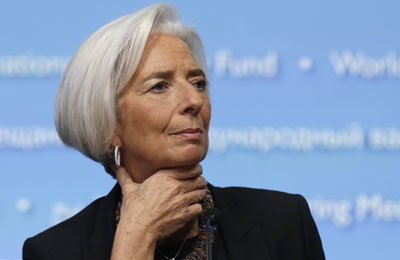
Christine Lagarde at a news conference
IMF tells world to do more on growth 'marathon'
Washington, April 11, 2014
The International Monetary Fund has urged nations around the world to move ahead more quickly on policies needed to secure a stronger recovery and avoid a prolonged global slump.
In a "Global Policy Agenda" for the world's economies, the IMF outlined a long list of tasks that remain incomplete, from reining in shadow banking risks in China to speeding up financial reforms.
The Washington-based Fund also said it was "utterly disappointed" the US again failed to pass historic reforms to the IMF meant to give more power to emerging markets.
"The key challenge remains transforming a modest and fragile recovery into more rapid, balanced, and sustainable growth," the IMF said ahead of its twice-yearly meetings with the World Bank that kick off on Friday. "This is a marathon, not a sprint."
Taking stock since the last meetings in October, the IMF saw similar risks on the table, including the chance for huge market and exchange rate volatility if the US Federal Reserve botches its exit from a massive monetary stimulus program, withdrawing too quickly or not communicating well enough.
"Such a scenario could be especially disruptive if financial stability risks from very accommodative monetary policies, including excessive risk-taking and leverage, are left unchecked by supervisory authorities," the IMF said.
The Fund said more coordination between central bank and financial regulators could limit exchange rate swings, and noted the concerns of major emerging market countries who have called for more cooperation on monetary policy. Some emerging markets suffered abrupt capital outflows over the past year as the Fed prepared to slow its money printing.
The IMF cautioned advanced economies to avoid withdrawing easy money too quickly, given a still-fragile recovery, low inflation and the struggle some countries faced crawling out from piles of debt in the wake of the financial crisis.
In a news conference ahead of semiannual meetings of the IMF and World Bank this weekend, IMF Managing Director Christine Lagarde welcomed the European Central Bank's stated commitment to ease monetary policy if needed to lift euro zone inflation.
"We are concerned about this potential risk of advanced economies in general, in the euro area in particular, that prolonged low inflation will hurt both growth and jobs," she said. "It is encouraging that the ECB reiterated its commitment to use unconventional measures as needed."
The Fund warned on the risk of a "hard landing" in China, the world's second-largest economy, which it said could have negative repercussions on other emerging markets.
"However, the likelihood of such an event remains small," the IMF said. It urged China to rein in risks in its shadow banking system and liberalize the financial sector to improve the allocation of credit.
Beijing is in the process of reforming its economy to allow market forces to play a larger role and recently loosened restrictions on movements in its yuan currency.
The yuan, or renminbi, has recently declined in value against the dollar, prompting worries in Washington that China's resolve to let market forces guide its currency was weakening.
Lagarde offered a different view. "I took the recent increase of the band of the renminbi as the move in the direction of internationalisation. I won't characterise it as an intended depreciation of the currency," she said.
COSTS OF SLOW GROWTH
Overall, the IMF urged countries to do more to boost growth, including through structural reforms if countries have no space to further boost spending or cut interest rates.
Growth is also a top priority for the Group of 20 leading advanced and emerging market economies, whose finance ministers were set to open a two-day meeting later on Thursday.
"The costs of continued sluggish growth are clear - there will only be modest income gains and gradual reductions in unemployment," the IMF said.
But the Fund saved its sharpest words for the lack of progress in passing 2010 reforms to its voting shares, or quotas, to give greater voice to emerging markets like China. The reforms have been held up by the U.S. Congress.
"The delay in making effective the 2010 reform package is utterly disappointing," the IMF said. "These reforms are essential to ensure the continued legitimacy, relevance, financial strength and effectiveness of the Fund." - Reuters







